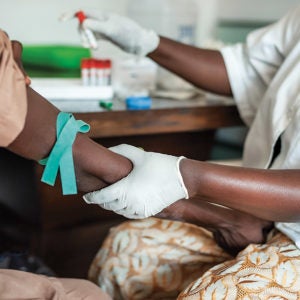 No to red meat, yes to healthier proteins
No to red meat, yes to healthier proteins
People who increased their daily servings of red meat over an eight-year period were more likely to die during the subsequent eight years compared with people who did not increase their red meat consumption, according to a new study. Researchers from the Harvard Chan School found that decreasing red meat and simultaneously increasing healthy alternative food choices such as nuts, fish, legumes, and whole grains over time was associated with lower premature mortality.
Published in June in BMJ, the study follows a meta-analysis of randomized clinical trials published in April in Circulation, which found that replacing red meat with healthy plant proteins led to decreases in risk factors for cardiovascular disease such as total and LDL cholesterol. Frank Hu, the Fredrick J. Stare Professor of Nutrition and Epidemiology, chair of the Department of Nutrition, and senior author of the BMJ study and co-author of the Circulation study, recommends adopting a Mediterranean-style or other diet that emphasizes healthy plant foods.
A new route to control cell metabolism and growth
An understudied enzyme may help fuel the metabolism of cancer cells and contribute to the development of other diseases, including diabetes and obesity. Gerta Hoxhaj, a postdoctoral fellow in the lab of Brendan Manning, professor of genetics and complex diseases, identified a previously unknown mechanism by which insulin sends a signal to activate an enzyme called NADK. This enzyme produces a “helper molecule” known as NADP, which is required for a type of metabolism called anabolism that allows cells to convert nutrients into biological materials, such as lipids and DNA, needed to make bigger cells or more cells. The insulin pathway is known to malfunction in human diseases, becoming defective in diabetes and overactive in cancer. Manning says that the new findings, published in March in Science, identify an important new metabolic target of the insulin pathway that contributes to both its physiological and pathological effects. Read more
 Dietary supplements may jeopardize health in young people
Dietary supplements may jeopardize health in young people
Children and young adults who consume dietary supplements sold for weight loss, muscle building, and energy may be jeopardizing their health. They have an increased risk of severe medical events such as hospitalization, disability, and death compared with young people who take vitamins, according to a study published in June in the Journal of Adolescent Health. “How can we continue to let the manufacturers of these products and the retailers who profit from them play Russian roulette with America’s youth?” asks senior author S. Bryn Austin, professor in the Department of Social and Behavioral Sciences. “It is well past time for policymakers and retailers to take meaningful action to protect children and consumers of all ages.” Read more
 Milton Weinstein honored at career symposium
Milton Weinstein honored at career symposium
Colleagues and former students of Milton Weinstein, the Henry J. Kaiser Professor of Health Policy and Management, gathered at the School on May 31 for a celebration honoring his 45-year career. Weinstein is known for his foundational work in comparative effectiveness, a field that seeks to identify which clinical and public health interventions work best for improving health. At the event, speakers praised Weinstein for the creativity and analytical rigor of his research, as well as for his generosity as a mentor and collaborator.
Harvey Fineberg, professor emeritus and former dean of the School, was a co-author with Weinstein of the book Clinical Decision Analysis, considered a classic text in the field. Fineberg said that as a researcher, it would be hard to find a “package more astute, more dedicated, more accomplished, more farsighted, and with a greater effect on many lives” than Weinstein. Read more
 Tackling HIV in Botswana
Tackling HIV in Botswana
In Botswana, an intervention in 15 communities to test for and treat HIV infection in all adult residents was effective in increasing population viral suppression to very high levels—meaning that the virus becomes undetectable and can’t be transmitted while patients are taking effective treatment. The intervention probably also contributed to a nearly one-third reduction in the incidence of HIV infection in participating communities. Led by researchers from the Harvard T.H. Chan School of Public Health and the Botswana Harvard AIDS Institute Partnership, plus collaborators at several other institutions, the study was published online July 18 in the New England Journal of Medicine. The researchers attribute the intervention’s success to an intensive HIV testing campaign, which occurred door to door and in mobile venues, and to follow-up by community health workers to ensure that everyone who tested positive for HIV showed up at a clinic for treatment.
Harvard and MIT team up to launch peer-reviewed data science journal
 The Harvard Data Science Initiative has launched the Harvard Data Science Review, an open-access peer-reviewed journal published by MIT Press that bills itself as “a microscopic, telescopic, and kaleidoscopic view of data science.” Adds Editor-in-Chief Xiao-Li Meng, “The central mission of the journal is to help define and shape what DS is or should be.”
The Harvard Data Science Initiative has launched the Harvard Data Science Review, an open-access peer-reviewed journal published by MIT Press that bills itself as “a microscopic, telescopic, and kaleidoscopic view of data science.” Adds Editor-in-Chief Xiao-Li Meng, “The central mission of the journal is to help define and shape what DS is or should be.”
Released in July, the first issue features articles on topics ranging from authorship attribution of John Lennon–Paul McCartney songs to machine-learning models for predicting drug approvals to artificial intelligence. Future issues will have a similar range of general interest, academic, and professional content intended to foster dialogue about data science across a range of audiences. In a joint statement, Francesca Dominici, co-director of the Harvard Data Science Initiative and the Clarence James Gamble Professor of Biostatistics, Population, and Data Science at the Harvard T.H. Chan School of Public Health, and David Parkes, the George F. Colony Professor of Computer Science at Harvard’s Paulson School of Engineering and Applied Sciences, said, “By sharing stories of positive transformational impact as well as raising questions, this collective endeavor will reveal the contours that will shape future research and practice.”







